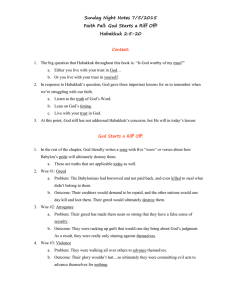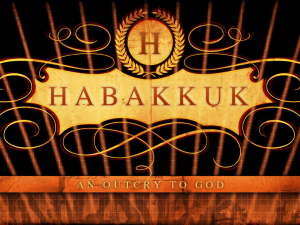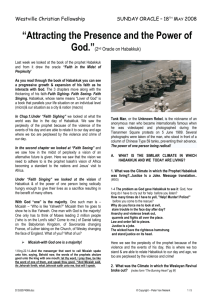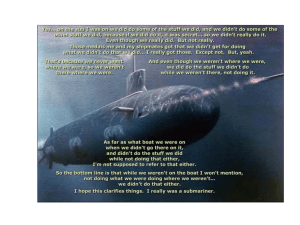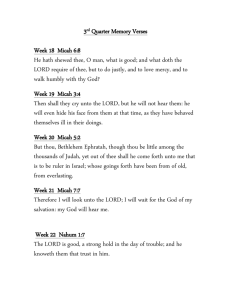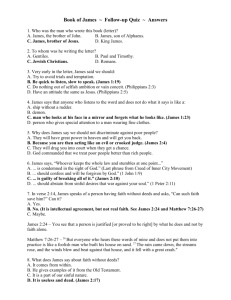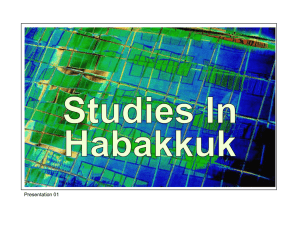A Perplexed Prophet With a Profound Theology
advertisement
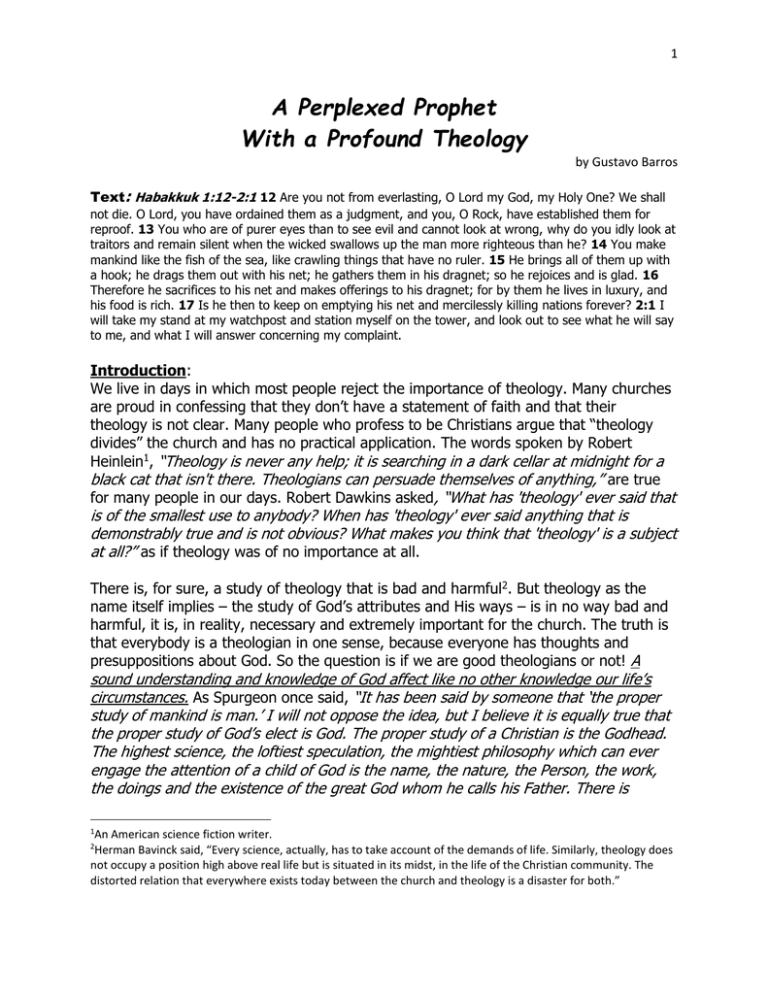
1 A Perplexed Prophet With a Profound Theology by Gustavo Barros Text: Habakkuk 1:12-2:1 12 Are you not from everlasting, O Lord my God, my Holy One? We shall not die. O Lord, you have ordained them as a judgment, and you, O Rock, have established them for reproof. 13 You who are of purer eyes than to see evil and cannot look at wrong, why do you idly look at traitors and remain silent when the wicked swallows up the man more righteous than he? 14 You make mankind like the fish of the sea, like crawling things that have no ruler. 15 He brings all of them up with a hook; he drags them out with his net; he gathers them in his dragnet; so he rejoices and is glad. 16 Therefore he sacrifices to his net and makes offerings to his dragnet; for by them he lives in luxury, and his food is rich. 17 Is he then to keep on emptying his net and mercilessly killing nations forever? 2:1 I will take my stand at my watchpost and station myself on the tower, and look out to see what he will say to me, and what I will answer concerning my complaint. Introduction: We live in days in which most people reject the importance of theology. Many churches are proud in confessing that they don’t have a statement of faith and that their theology is not clear. Many people who profess to be Christians argue that “theology divides” the church and has no practical application. The words spoken by Robert Heinlein1, “Theology is never any help; it is searching in a dark cellar at midnight for a black cat that isn't there. Theologians can persuade themselves of anything,” are true for many people in our days. Robert Dawkins asked, “What has 'theology' ever said that is of the smallest use to anybody? When has 'theology' ever said anything that is demonstrably true and is not obvious? What makes you think that 'theology' is a subject at all?” as if theology was of no importance at all. There is, for sure, a study of theology that is bad and harmful2. But theology as the name itself implies – the study of God’s attributes and His ways – is in no way bad and harmful, it is, in reality, necessary and extremely important for the church. The truth is that everybody is a theologian in one sense, because everyone has thoughts and presuppositions about God. So the question is if we are good theologians or not! A sound understanding and knowledge of God affect like no other knowledge our life’s circumstances. As Spurgeon once said, “It has been said by someone that ‘the proper study of mankind is man.’ I will not oppose the idea, but I believe it is equally true that the proper study of God’s elect is God. The proper study of a Christian is the Godhead. The highest science, the loftiest speculation, the mightiest philosophy which can ever engage the attention of a child of God is the name, the nature, the Person, the work, the doings and the existence of the great God whom he calls his Father. There is 1 An American science fiction writer. Herman Bavinck said, “Every science, actually, has to take account of the demands of life. Similarly, theology does not occupy a position high above real life but is situated in its midst, in the life of the Christian community. The distorted relation that everywhere exists today between the church and theology is a disaster for both.” 2 2 something exceedingly improving to the mind in a contemplation of the Divinity. It is a subject so vast, that all our thoughts are lost in its immensity—so deep that our pride is drowned in its infinity. Other subjects we can compass and grapple with—in them we feel a kind of self-content and go our way with the thought, ‘Behold I am wise.’ But when we come to this master science, finding that our plumb line cannot sound its depth and that our eagle eye cannot see its height, we turn away with the thoughts that vain man would be wise, but he is like a wild ass’ colt and with the solemn exclamation, ‘I am but of yesterday and know nothing.’ No subject of contemplation will tend more to humble the mind, than thoughts of God.3” - that is, Theology. In these verses of the book of Habakkuk we can see how theology is important and practical in the life of God’s people. The knowledge of who God is affects our sufferings, our prayers, our walk in this fallen world, and our view of everything else. May the Lord open our eyes and give us a sound theology so that we may stand firm when the storms come! Outline of the Sermon: I – The Declaration (1:12) – Habakkuk declares who his God is. He declares to himself who the Lord is. II – The Complication (1:13-17) – Habakkuk is perplexed by God’s answer. It is too intriguing and complicated for his mind to understand how God could use such an evil nation. III – The Determination (2:1) – Habakkuk is determined to wait for God’s answer. Context: The days are evil. The religious reform brought by the king Josiah died with the king’s own death in 609 B.C. The prophet Habakkuk has seen a drastic and dramatic change in his society – the law of the Lord that was respected and obeyed is now being twisted and rejected. Justice is perverted and the nation of Judah is going from bad to worse. Habakkuk has been praying, asking the Lord to change the heart of the people, crying for the Lord’s help – for the prophet knows that only the sovereign Lord (Yahweh) has the power to change things. In 1:2-4 we see Habakkuk crying out to the Lord in prayer, asking God how long He would take to come and intervene in the situation. The prophet also asked why God was ignoring all the injustice and wickedness in his country. Habakkuk wondered why God was so tolerant. God’s time and tolerance were hard for Habakkuk to bear. The Lord answers Habakkuk’s prayer in 1:5-11 with a more perplexing answer. God tells the prophet that He is not sleeping, but He is raising the Babylonians to come, destroy, and judge the nation of Judah. God Himself is bringing a more sinful and wicked nation as His instrument of judgment. If the prophet Habakkuk was perplexed by the way the Lord was dealing with Judah by allowing injustice and violence to be all over the place, now Habakkuk is even more perplexed, for God is bringing a worse nation to judge Judah. 3 Charles Spurgeon Spurgeon’s Sermons Vol. 1 – From a Sermon Delivered on January 7, 1855 titled: The Immutability of God. 3 Now in 1:12-2:1 we see the prophet coming to the Lord in prayer, presenting to God his perplexity and lack of understanding of God’ mysterious ways. I – The Declaration (1:12) Verse 12 is crucial in order to understand the rest of the prayer. Verse 12 is the foundation of the prophet’s prayer. Verse 12 serves as the cornerstone of the prayer in verses 13-17. The perplexity, confusion, and questions are built upon verse 12. After the perplexing and mind-boggling answer Habakkuk comes to the Lord once again in prayer. “Are you not from everlasting, O Lord my God, my Holy One?” --- That is a rhetorical question, implying that the answer is “yes!” v.12 Habakkuk starts his prayer with a profound understanding of who God is. This prophet has a proper and sound theology. He starts his prayer reminding himself of Who his God is and declaring to God who He is. Habakkuk’s eyes are on God (see v.5)! Habakkuk exalts God and reminds himself that God is: םֶד ֶֶ֫ ק 1 – EVERLASTING ( ) --- Habakkuk declares that his God is eternal. He was not created by anyone or by anything. As A.W. Tozer says, “God is infinite! That is the hardest thought I will ask you to grasp. You cannot understand what infinite means, but don’t let it bother you – I don’t understand it and I’m trying to explain it! ‘Infinite’ means so much that nobody can grasp it, but reason nevertheless kneels and acknowledges that God is infinite. We mean by infinite that God knows no limits, no bounds, and no end. What God is, He is without boundaries. All that God is, He is without bounds or limits.4” God is from eternity and from eternity past He chose to save His people. What a glorious truth it is for temporal and finite beings to know that our God is everlasting. Our sufferings and tribulations are temporary, but our God is eternal. Everything that is happening in history is under His eternal power and control. His love, mercy, grace, righteousness, and holiness are everlasting! God’s covenant with His people and His kingdom are everlasting! הִ יֹ הְ י 2 – the LORD ( ) --- God’s covenantal name. God is all powerful and all sufficient, but at the same time He is among His people. This name brings to mind the moment when God reveals Himself to Moses and calls him to deliver the nation of Israel from slavery. It is God’s guarantee to be with His people. It speaks of God being a warrior that fights for His people. Yahweh manifested Himself fully in the person of Jesus, who came to rescue His people from a much worse slavery and bring a much better redemption. Jesus is Yahweh, the Lord of lords! How important it is for us to be 4 A.w.Tozer, The Attributes of God – A Journey Into the Father’s Heart (Christian Publications), p.4 4 reminded that our God is Yahweh, the One who is transcendent and at the same time present, the God of our covenant who fights for us. םיִיְ הק 3 – GOD ( ) --- Elohim reminds us of the Creation. This name speaks of God’s might and strength. Even though the enemies that surround us look mighty and strong they are nothing compared to Elohim. As we declare that our God is Elohim, the Mighty Creator, we are reminded that everything is under His mighty hand םֹו ֶָ֫ק 4 – the HOLY ONE ( ) --- It speaks of God’s perfection. He is totally perfect. His ways are perfect and holy. All his judgments are holy. It is God’s holiness that must put us on our knees in reverence and awe (Rev. 15:4) This perfect and eternal holiness causes God to punish all evil. As we go through tribulations and persecutions we can have the assurance that God will punish all the evil. As we think about God’s holiness we are reminded that the outcome of our tribulations will be good and perfect. רּוצ 5 – the ROCK 5 ( ) --- It speaks of God’s immutability. He doesn’t change. Things and events change around us, but God doesn’t change! Jobs, health, wealth, and other things will change and are changing in our lives, but we can be sure that God never changes. It also speaks of the protection we find in God alone. Psalm 18:1-2 I love you, O Lord, my strength. 2 The Lord is my rock and my fortress and my deliverer, my God, my rock, in whom I take refuge, my shield, and the horn of my salvation, my stronghold, 31 For who is God, but the Lord? And who is a rock, except our God? According to I Corinthians 10:4 the Rock is Christ! He is the rock on which the church is being built and also the stumbling-rock on which unbelievers stumble and fall! See Isaiah 26:4 Trust in the Lord forever, for the Lord God is an everlasting rock. A Lesson on Prayer: Habakkuk 1:12 teaches how important it is for Christians to start the prayer time exalting the name of God and proclaiming and being reminded of all His majestic attributes. When Jesus taught the disciples how to pray He showed that we must start by exalting the name of God6. When the early church was going through persecution the believers’ prayers started magnifying the attributes of God7. That is how we should pray when the Lord answers our prayers with perplexing and mind-boggling answers. May we also start our prayers with our eyes on God, beholding His wonderful character! 5 See Deuteronomy 32:4, 15, 18, 30 and 31. Luke 11:1-2 Now Jesus was praying in a certain place, and when he finished, one of his disciples said to him, “Lord, teach us to pray, as John taught his disciples.” 2 And he said to them, “When you pray, say: ‘Father, hallowed be your name.’ 7 Acts 4:23-24 When they were released, they went to their friends and reported what the chief priests and the elders had said to them. 24 And when they heard it, they lifted their voices together to God and said, “Sovereign Lord, who made the heaven and the earth and the sea and everything in them, 6 5 The Contrast: It is important to notice the radical contrast between the gods of the Babylonians (1:11) with the God of Habakkuk. The Proclamation: The understanding of who God is affects and effects the lifestyle of the believer. Habakkuk shows that theology is extremely practical in the life of the person who is suffering. v.12b – “We shall not die” --- After meditating and proclaiming who his God is, the prophet yells with all his strength the assurance that he and all the righteous people will not die. Habakkuk’s heavy and profound understanding of God and his knowledge of the true God affected and changed his perspective of life. Not Physical Death: Habakkuk is not talking about physical death, because he knows that everyone will physically die one day. The prophet is talking about the destruction of his soul, he is talking about the “second death” of Revelation 20:68. Habakkuk knows that his soul will not perish in hell. He declares with boldness, “We will not die!” Why? Because God is everlasting, God has an eternal covenant with us, God is fighting for us, God is the eternal creator, and God is perfect in His ways. There can be deportation, discipline, and destruction all around us but in Christ we are safe forever! The life of the righteous person is hidden with Christ (Col. 3:2-4 Set your minds on things that are above, not on things that are on earth. 3 For you have died, and your life is hidden with Christ in God. 4 When Christ who is your life appears, then you also will appear with him in glory). The life of the believer is clothed and wrapped with the righteousness of Jesus. The eternal life is present in the life of the believer and we live in Christ, because He lives forever (John 14:19 - Yet a little while and the world will see me no more, but you will see me. Because I live, you also will live). As the storm comes crushing the boat of our lives we can stand upon Christ and declare that we will not die the second death! Daniel’s three friends expressed this truth when Nebuchadnezzar threw them into the furnace – Dan. 3:16-17 Shadrach, Meshach and Abednego replied to him, “King Nebuchadnezzar, we do not need to defend ourselves before you in this matter. 17If we are thrown into the blazing furnace, the God we serve is able to deliver us from it, and he will deliver us from Your Majesty’s hand. 18But even if he does not, we want you to know, Your Majesty, that we will not serve your gods or worship the image of gold you have set up.” How practical and comforting is sound theology! A deep understanding of God can change our souls and calm us during the storms. Spurgeon said, “Oh, there is, in contemplating Christ, a balm for every wound! In musing on the Father, there is a quietus for every grief and in the influence of the Holy Spirit there is a balsam for every sore. Would you lose your sorrows? Would you drown your cares? Then go plunge 8 Revelation 20:6 Blessed and holy is the one who shares in the first resurrection! Over such the second death has no power, but they will be priests of God and of Christ, and they will reign with him for a thousand years. 6 yourself in the Godhead’s deepest sea—be lost in His immensity. And you shall come forth as from a couch of rest, refreshed and invigorated. I know nothing which can so comfort the soul, so calm the swelling billows of grief and sorrow—so speak peace to the winds of trial—as a devout musing upon the subject of the Godhead.9” The Certainty of God’s Sovereignty: Habakkuk’s sound theology leads him to understand that God is in control of everything: O Lord, you have ordained them as a judgment, you, O Rock, have established them for reproof/correction He knows that God’s mighty hand is behind this terrible disaster. God had promised that He would discipline the nation of Israel with the “rod of men.10” Even the terrible judgment of bringing the violent Babylonians to destroy the nation of Judah was, in the eyes of Habakkuk, God’s good, holy, and perfect will11. During that period of suffering the unbelievers were going to be judged while the faithful ones were going to be corrected and sanctified. Habakkuk acknowledges and accepts the truth that God is the One who brings not only blessings, but also the disasters12. He is not the author of evil, but He allows bad things to happen for His own glorious and mysterious ways. What a difference from Toni Campolo’s article “Katrina: Not God's Wrath--or His Will”, where he says that disaster, like the hurricane Katrina, are not part of God’s will13. II – The Complication (1:13-17) As we come to these verses, after studying verse 12, we know that Habakkuk doesn’t have a problem with unbelief. He is not questioning the existence of God, or the holiness, or the sovereignty of God, but he is seeking to understand God’s perplexing and mysterious ways. He wants to connect God’s mercy and holiness with God’s terrible and mysterious judgment. Habakkuk doesn’t have a weak and feeble faith, his faith is strong for he knows his God, but he has a perplexing faith in view of a God who works in perplexing and mysterious ways. To be perplexed is part of our journey in this world - II Corinthians 4:8 We are afflicted in every way, but not crushed; perplexed, but not driven to despair. 9 Spurgeon’s Sermons Vol. 1 – From a Sermon Delivered on January 7, 1855 titled: The Immutability of God II Samuel 7:14 I will be to him a father, and he shall be to me a son. When he commits iniquity, I will discipline him with the rod of men, with the stripes of the sons of men. 11 See Albert Mohler - http://www.albertmohler.com/2005/09/07/god-in-the-storm-part-one/; http://www.albertmohler.com/2005/09/07/god-in-the-storm-part-one/ 12 Habakkuk 1:6 For behold, I am raising up the Chaldeans, that bitter and hasty nation; Isaiah 45 :6-7 I am the Lord, and there is no other. 7 I form light and create darkness, I make well-being and create calamity, I am the Lord, who does all. 13 http://www.beliefnet.com/Faiths/Christianity/2005/09/Katrina-Not-Gods-Wrath-Or-His-Will.aspx# 10 7 v.13 - Your eyes are too pure to look on evil; you cannot tolerate wrongdoing. Why then do you tolerate the treacherous? Habakkuk is still standing firm on God’s holiness and holy ways. “Your eyes are too pure to look on evil” --- The Bible is clear that God sees everything. He sees and knows about all the evil that happens around the world. Habakkuk is not saying that God is blind for evil things. The words “to look on evil” mean to delight and approve. God doesn’t create, delight in, or approve evil14! But nonetheless, He allows and uses evil for His glory. “Why then do you tolerate the treacherous? Why are you silent while the wicked swallow up those more righteous than themselves?” --- Habakkuk is perplexed by how God can use the even more evil Babylonians to judge the Jews. As McComiskey says in his commentary, “Should not Yahweh’s instrument for the accomplishment of his purpose reflect something of his own purity and righteousness… The cure is far worse than the disease.15” It is intriguing and perplexing that a holy and righteous God would use an evil and perverse nation as His instrument of judgment! Today: Many Christians under communist and Islamic government oppression ask the same question. Why let the Communist government of North Korea and China kill thousands of Christians? Why should God raise the Nazi Germany to destroy other nations? How can God raise the Muslims to overtake Europe and kill thousands of Christians? It is perplexing and beyond our ways. ** Some time has passed between 1:2-11 and 1:12-17, for now Habakkuk is seeing the evil things that the Babylonians are doing. Probably the Babylonians started invading Judah by this time. “while the wicked swallow up those more righteous than themselves” --- As God opened the earth to swallow up the Egyptians in the Red Sea (Exod. 15:12) and the rebellious Abiram (Num. 16:30), now the Israelites are being swallowed up. These words are very similar to Jeremiah’s (Jer. 12:1-2). And make us desire eternity in Heaven even more, where the wicked and treacherous will not seem to win. – “You make mankind like the fish of the sea, like crawling things that have no ruler” --- Habakkuk continues affirming the sovereignty of God, by stating v.14 that it was God Himself who raised the Babylonians to judge the nations. 14 15 I John 1:5 God is light, and in him is no darkness at all. Thomas E. McComiskey, The Minor Prophets – An Exegetical and Expository Commentary (Baker), p. 853 8 The prophet compares the nations that are being conquered by the Babylonians to fish and other animals to illustrate the lack of respect and dignity that the Chaldeans show. The authority given to Adam is now used and abused by the Babylonians (see Gen. 1:28). – “He brings all of them up with a hook; he drags them out with his net; he gathers them in his dragnet; so he rejoices and is glad” --- Habakkuk v.15 continues using the image of fish. Like a fisherman the king of Babylon drags all the nations to his net. As fish inside the net, the nations are helpless and cannot avoid being taken and destroyed. The hook and the net picture the brutality and violence of the Babylonians. “Not just figuratively but literally they carried on the Assyrian tradition of driving a hook through the sensitive lower lip of their captives and stringing them single file. In such a diabolical method they enforced docility.16" “so he rejoices and is glad” --- Their joy is in their own strength. Their joy and gladness are in the things they possess. Like all unbelievers, the joy of the Babylonians is far away from the Lord. ** Where is our joy? “Therefore he sacrifices to his net and makes offerings to his dragnet; for by them he lives in luxury, and his food is rich.” --- The depravity of man! v.16 – This is not only a description of the Babylonians, but of every person who is not born of God. The heart is full of idols. They worship the creatures instead of the Creator, the things instead of the Giver of all things, the strength instead of the One who gives strength. They worship whatever gives them pleasure, because they are selfish! They worship their “nets”, how blind can the blind be?! That is what Nebuchadnezzar did, he worshiped his own strength - See Daniel 4:29-30 At the end of twelve months he was walking on the roof of the royal palace of Babylon, 30 and the king answered and said, “Is not this great Babylon, which I have built by my mighty power as a royal residence and for the glory of my majesty?” Have we been giving praise and adoration to God alone? Have we been grateful and thankful to God? Have we been idolizing and worshiping things that God has given us? What has been taking the place of God in our lives? There is a dangerous pattern: Verse 15 says that they rejoiced in their nets and verse 16 says that they worship their nets. Whatever gives us the most joy, it will be the thing we will worship and idolize! 16 O. Palmer Robertson, TNICOT – The Books of Nahum, Habakkuk, and Zephaniah (Eerdmans) p. 162 9 “Is he then to keep on emptying his net and mercilessly killing nations forever?” --- When we are suffering it seems that the suffering will never end. Habakkuk finishes his prayer with a question to which he knows the answer. He knows that God is holy in His judgments. He desires to be refreshed by the Word of God telling him that God will judge them. “Lord, tell me again that you will, one day, judge the evil v.17 – ones and abolish perversity!” III – The Determination (2:1) 2:1 I will take my stand at my watchpost and station myself on the tower, and look out to see what he will say to me, and what I will answer concerning my complaint. So Habakkuk surrenders all his questions and perplexities to God. He knows that God will do something and will answer his prayer somehow. By now Habakkuk knows that God’s answer can be very different from what he expects. “I will take my stand and at my watchpost/watchtower” --- Waiting on the Lord is active. Surrendering to the Lord is always active. Habakkuk is behaving like a soldier watching over a city or a shepherd taking care of his flock. He is awake and watching. Spurgeon comments, "One of Satan’s devices is that he seeks to lull God's prophets into slumber, for he knows that dumb dogs that are given to sleep will never do any very great injury to his cause. The wakeful watchman he always fears, for then he cannot take the city by surprise." ** Are we awake? “and look out to see what he will say to me” --- Habakkuk stands waiting for God’s action. He doesn’t resort to his own imagination or the imagination of men, but he waits for God’s Word! He is determined to wait for God’s answer, for he knows that he doesn’t have the answer for all the problems and dilemmas of life. Because Habakkuk knows His God he can take his post and wait for an answer from God. His sound theology leads him to cast upon the Lord all his anxieties and perplexities. What - a practical lesson on what to do when going through tribulations: Stand firm on what you know – on the character of God revealed in Scriptures. Wait on the Lord! Cast upon the Lord all your perplexities! God uses our prayers! May we be zealous to pray and commune with God. How much stress and stomach problems we would avoid if we only follow the example of Habakkuk. Conclusion: As we can see in the life of Habakkuk, theology has a profound and tremendous impact in the life of the believer. When God’s perplexing and strange ways come and shake our 10 lives – taking away things and people that are precious to us – how important it is to know our God. We may not understand all the sufferings and problems that come crashing into our lives, but we must understand who God is! How wonderful it is to know that we have a God who is in control of everything! How wonderful it is to know that we have a God who is Holy in all his ways! How precious it is to know that we have a God that fights for His people! Who is like our God? So powerful, so majestic, so awesome in glory and still cares so much about His children that He calls us to come to Him in prayer! Philippians 4:5-7 The Lord is at hand; 6 do not be anxious about anything, but in everything by prayer and supplication with thanksgiving let your requests be made known to God. 7 And the peace of God, which surpasses all understanding, will guard your hearts and your minds in Christ Jesus. How wonderful it is for us to come to God with our supplications, but let us come like Habakkuk came – by first exalting God’s character! Isaiah 26:3 You keep him in perfect peace whose mind is stayed on you, because he trusts in you. I Peter 5:6-7 Humble yourselves, therefore, under the mighty hand of God so that at the proper time he may exalt you, 7 casting all your anxieties on him, because he cares for you. God cares so much about us that He gave Christ for the sins of His people. Jesus Christ came to save sinners like me. And He brought salvation by the most perplexing way anyone could ever imagine – by dying on a shameful cross. But Jesus conquered death by His resurrection and became the Rock where we find everlasting life. May the message of the cross be not a stumbling rock, but a strong shelter for you! We will not die because Christ lives! The righteous shall live forever by faith! More resources online: http://www.preceptaustin.org/Habakkuk_1_commentary.htm#1:5 http://thegospelcoalition.org/resources/scripture-index/a/habakkuk http://www.monergism.com/directory/search.php?action=search_links_simple&search_kind=and&phrase=habakkuk&B1.x=0& B1.y=0 http://archive.org/stream/biblicalillustra282exel#page/n42/mode/1up http://www.sermonaudio.com/sermoninfo.asp?SID=2180472415 http://www.gracebaptistcarlisle.org/~gbcchurch/Chantry/Habakkuk%20Series/2000-Nov-05%20Hab%201vs122vs1%20Habakkuk%27s%202nd%20Prayer%20-%203.mp3
